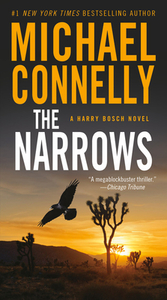You need to sign in or sign up before continuing.
Take a photo of a barcode or cover
dark
mysterious
tense
medium-paced
Plot or Character Driven:
A mix
Strong character development:
No
Loveable characters:
No
Diverse cast of characters:
No
Flaws of characters a main focus:
No
So much promise, so much meh. Am I really supposed to believe that Walling, a top FBI profiler now in disgrace, doesn't know basic firearms maneuvers? Or that she'd rush into an active crime scene and start grabbing on things, without even a "I know I should've waited but, dang it, time was of the essence!" or "I lost my head! It won't happen again!"
Nada. She's just basically the worst law enforcement officer in existence. Nice work with the jumper cables, btw. *shakes head*
Still, the Bosch parts are good, like they always are, even if Bosch is still in the running for Most Emo Police Officer In Existence. Terry McCaleb was enjoyable as a character, finally, what with being dead, and Connelly continues to give amazing L.A., this time with a side order of awesome Vegas that was entirely missing from [b:Trunk Music|58962|Trunk Music (Harry Bosch, #5)|Michael Connelly|https://d.gr-assets.com/books/1386926044s/58962.jpg|449499]. And I liked the whole conversation about retired policemen, because it doesn't seem to come up as often or as well in other crime fiction.
A decent Bosch is better than no Bosch at all.
Nada. She's just basically the worst law enforcement officer in existence. Nice work with the jumper cables, btw. *shakes head*
Still, the Bosch parts are good, like they always are, even if Bosch is still in the running for Most Emo Police Officer In Existence. Terry McCaleb was enjoyable as a character, finally, what with being dead, and Connelly continues to give amazing L.A., this time with a side order of awesome Vegas that was entirely missing from [b:Trunk Music|58962|Trunk Music (Harry Bosch, #5)|Michael Connelly|https://d.gr-assets.com/books/1386926044s/58962.jpg|449499]. And I liked the whole conversation about retired policemen, because it doesn't seem to come up as often or as well in other crime fiction.
A decent Bosch is better than no Bosch at all.
Continuation from The Poet.
A very good book. Very detailed about how the Poet goes about killing people and setting trap after trap for Rachel Walling to follow and hopefully stumble.
What I liked about this book is how the writer goes into detail about the movement and the plans of The Poet.
Other than that, the ending was also good because the reason why Terry McCaleb died wasn't because of the Poet but he did so for the betterment of the family
A very good book. Very detailed about how the Poet goes about killing people and setting trap after trap for Rachel Walling to follow and hopefully stumble.
What I liked about this book is how the writer goes into detail about the movement and the plans of The Poet.
Other than that, the ending was also good because the reason why Terry McCaleb died wasn't because of the Poet but he did so for the betterment of the family
I think this was supposed to be a sequel to The Poet, but it was not nearly as good as that book.
adventurous
medium-paced
Plot or Character Driven:
A mix
Strong character development:
No
Loveable characters:
Yes
Diverse cast of characters:
No
Flaws of characters a main focus:
N/A
adventurous
challenging
dark
mysterious
sad
tense
medium-paced
Plot or Character Driven:
A mix
Strong character development:
Yes
Loveable characters:
Complicated
Diverse cast of characters:
Yes
Flaws of characters a main focus:
Yes
dark
emotional
mysterious
tense
fast-paced
adventurous
medium-paced
Plot or Character Driven:
Plot
Loveable characters:
Yes
Diverse cast of characters:
Yes
I enjoyed The Poet much more than this sequel. Always a good brain rest from anything too deep.





